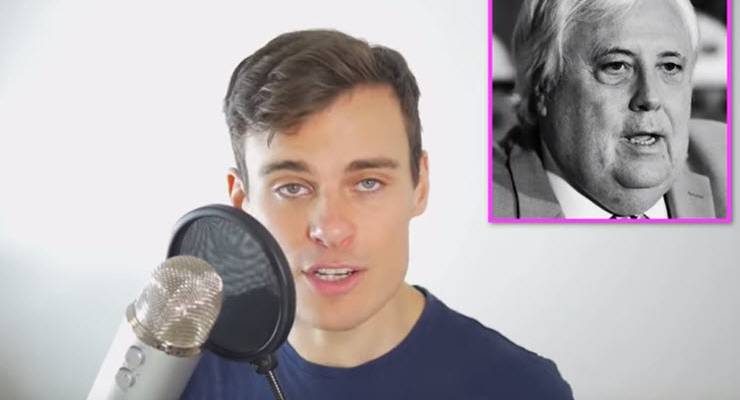
Last week, Clive Palmer made headlines for threatening to sue Australian YouTuber Jordan Shanks (Friendlyjordies) over a video posted earlier this year. Palmer claims the content was defamatory as it caused him “extreme embarrassment and humiliation; and damage to professional, personal and political reputation”.
Palmer’s threat — foreshadowing damages of half a million dollars — follows a trend of an increasing number of defamation suits lodged over online posts, including on social media.
The case of Clive Palmer
Shanks, who produces and stars in viral news and political videos under the pseudonym Friendlyjordies, posted a video last week revealing that he’d been sent a defamation concerns letter from Alexander Law, representing the United Australia Party leader.
The letter states that comments made in a Friendlyjordies video from January were defamatory — Shanks had called Palmer “fatty McFuckhead” and a “dense Humpty Dumpty”, among other insulting terms. The letter also said cited images depicting Palmer as a baby being held by Donald Trump and superimposed on Homer Simpson and other accusations relating to Palmer’s business conduct.
The letter asked Shanks to remove all material referring to Palmer from any Friendlyjordies accounts and sites within 28 days, or he’d take the case to the Supreme Court in Brisbane where Shanks would be sued for $500,000.
Instead, Shanks doubled down. In a response video, he expanded on each defamation claim and explained why he believed the remarks he made were true and could not further damage Palmer’s reputation. “I’m a millennial — going bankrupt doesn’t scare me,” he said in the video. “I have as many assets as you have seats in parliament — none.” The video has more than 680,000 views.
Do these threats usually work?
Legal letters — known as a concerns notice — don’t usually provoke such a sassy (or viral) response. Most times, when faced with legal threats from powerful figures, small publishers simply remove the offending content, apologise, and pay a small fee to avoid having to go to court. These letters, notes media lawyer and defamation expert Matt Collins, are generally pretty heavy-handed.
“The mere threat of defamation action, particularly by someone powerful and wealthy is threatening and intimidating. Very often the recipient just pulls content down,” Collins told Crikey.
But small publishers aren’t the only ones to deal with this. Defamation cases from comments made by private, relatively resourceless citizens have soared in recent years. According to a report by judge Judith Gibson, two-thirds of cases now involve the internet, with many of these cases against comments made on social media.
“If you get a concerns notice from a powerful person, you have to make a decision: remove it and comply, or form an assessment about whether the person is serious and determined enough to carry it through and take it to court,” Collins said.
Using the threat of a defamation suit isn’t uncommon either. In the ’60s and ’70s, politicians routinely sued media outlets; while in the ’80s and ’90s, suing to silence was so common it was given an acronym: SLAPP (strategic litigation against public participation). Court is costly, no matter the outcome, so most would prefer to pay a fee and apologise.
“This is what we call the ‘chilling effect’ in defamation law,” Collins said. “It’s easier just to give in to the threat than to face an expensive and complicated lawsuit.”
What about the publishing platforms?
Sending legal letters to individuals is one tactic; another is going straight to the top and requesting platforms like YouTube or Facebook take content down. This often works well for hate speech or inappropriate content because it is fast. But it presents a problem for defamation and freedom of speech, according to defamation lawyer and senior law lecturer at the University of Western Australia Michael Douglas.
“When you report it, you’re asking employees [of tech companies] to undertake the same balancing exercise as the courts,” Douglas told Crikey. “Individuals won’t give it as much attention as a court would, they won’t be as educated as a judge is, and corporate policy is not aligned with democracy.
“Is it a good thing we’re outsourcing the balancing of fundamental rights to multinational corporations in the US?”
Removing a user from a platform is called de-platforming. Initially, platforms refused to play the part of moderators but then ramped up efforts in 2017, following criticism from international governments.
“It shows the fast justice of platforms’ self-regulation might not be as fair as the justice we’d expect from a court,” Douglas said. “A fundamental aspect of the judicial system is everyone is subject to the same standards.”
The Council of Attorneys-General is currently reviewing Australian defamation law. “Hopefully, once finished, it’ll be easier for everyday people who aren’t Clive Palmer-level wealthy to get access to justice,” Douglas said.








Crikey encourages robust conversations on our website. However, we’re a small team, so sometimes we have to reluctantly turn comments off due to legal risk. Thanks for your understanding and in the meantime, have a read of our moderation guidelines.